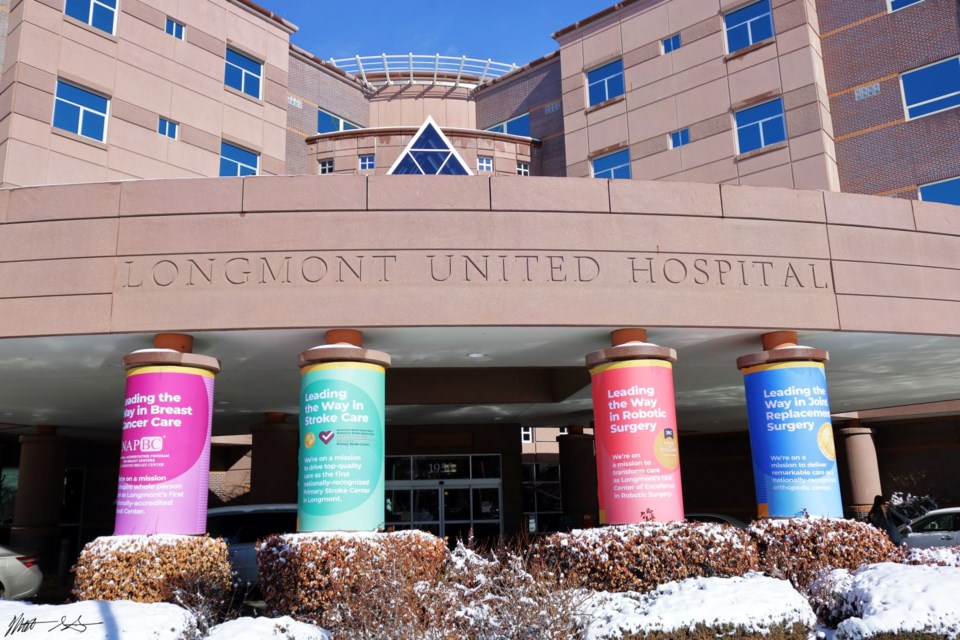Because Weld County has refused to comply with the state’s orders to limit the spread of COVID-19, Weld residents need to be put to the back of the line when they seek medical care at Longmont hospitals, Mayor Brian Bagley said Tuesday.
Bagley is pushing an ordinance that would bar Longmont’s two hospitals from providing medical care to a Weld County resident if they are vying for care with someone who resides in a county that follows state-approved COVID protocols.
The ordinance is scheduled to be considered next Tuesday by city council, whose members are backing the idea, Bagley said.
Bagley, who has long complained about orders that call for businesses to shut down during the pandemic — said he’s fine with Weld County commissioners’ recent decision not to comply with the restrictions that come with the Colorado Department of Public Health and Environment elevating the county to red status on the state’s COVID-19 dial dashboard.
He is angry, however, that Weld County is taking advantage of Longmont’s adherence to COVID guidelines and its residents are using local hospitals for COVID treatment.
Boulder County also was moved to red status on Friday.
“I don’t think it’s fair that Longmont is facing more restrictions that are made worse by the non-compliance of communities like Weld County,” Bagley said. “This doesn’t mean Weld County should be able to come in and use valuable hospital resources because we are complying.”
Weld County commissioners, in a statement emailed Tuesday afternoon, blasted Bagley’s proposed resolution, calling him “simple.” They stated Bagley is taking a page out of Gov. Jared Polis’ playbook by going after working families and compromising the mental well-being of the people who live in his community.
“The answer to this pandemic is not solely to close down small businesses the week of Thanksgiving; it is not to continually punish working-class families or the individuals who bag your groceries, wait on you in restaurants, deliver food to your home while you watch Netflix and chill; and it is certainly not to illegally deny health care to residents. But this is what this simple mayor wants to do.”
Weld County is not an “‘anything goes’ county, it is a ‘make the best decisions for yourself and your business’ county, because we trust our residents to do what is best for themselves, their families, their businesses and their community,” the commissioners stated. “If the mandates put in place months ago worked, why are the numbers going up along the Front Range.
“Mayor Bagley is looking for someone/something to blame. Hear this: Weld County is not the problem.”
Colorado Hospital Association spokesman Joshua Ewing said Tuesday any ordinance might not be legal since it bumps up against a federal law that says no one can be passed over for treatment based on where they live.
“We are not checking IDs at the door,” Ewing said.
The proposed Longmont resolution reads in part: “... citizens of Weld County have a constitutional right to travel, to assemble, and to earn a living for their families, even in times of crisis, no matter how dire. … Weld County is able to presently embrace and enjoy these rights only as a result of Longmont’s compliance with the governor’s emergency orders, temporarily surrendering our ability to travel, assemble, and earn a living in order to guarantee hospital availability. … Longmont may face limited hospital capacity in the future as a result of Weld County’s refusal to comply with the governor’s emergency orders.”
The ordinance to be weighed by council next week will state: “It shall be unlawful for any hospital (or health care provider) to provide medical services to any resident of a county or municipality wherein their elected officials have refused to comply with the governor’s emergency orders so long as there is a resident of a county or municipality that does comply with the governor’s emergency orders needing access to Longmont hospitals.”
Weld County on Tuesday had a two-week average positive COVID test rate of 15.95%, 306 hospitalizations and 126 deaths, according to county data. The 14-day positivity rate is above the World Health Organization’s recommended rate of 5%.
Boulder County’s 14-day positivity rate as of Thursday was 8.2%, according to county data. Hospitalizations stood at 330 on Tuesday and 117 people had died with COVID.
As of Tuesday, there were 119 COVID patents in Boulder County hospitals, 31 of which are in Longmont hospitals, Dan Eamon, Longmont’s assistant public safety chief, said in an email.
There are two hospitals in Greeley in Weld County, and there are 76 COVID patients in those hospitals, Eamon said. In Boulder County, there are 107 total ICU beds, 77 of them staffed and 10 of which are available. In the Weld hospitals, there are 78 ICU beds, 44 of which are staffed, and three are currently available, Eamon said.
The statistics did not indicate where COVID-19 patients live.
There are more than 4,000 registered Longmont voters living in Weld County, Weld County Clerk and Recorder Carly Koppes told The Leader in October.
Centura Health spokesman Kevin Masse in an email said COVID-19 patient numbers frequently change, even multiple times a day, especially as new patients are admitted and others are discharged. Longmont United Hospital is part of the Centura Health system.
“The number at any given moment does not provide a reliable or meaningful view of our ability to care for patients,” Masse said. “Since Centura is part of a connected system, we are able to use our transfer center to move patients among facilities if needed.”
Centura’s hospitals throughout the state remain busy, he said. “However, we remain confident in our ability to care for all patients in our community.”



